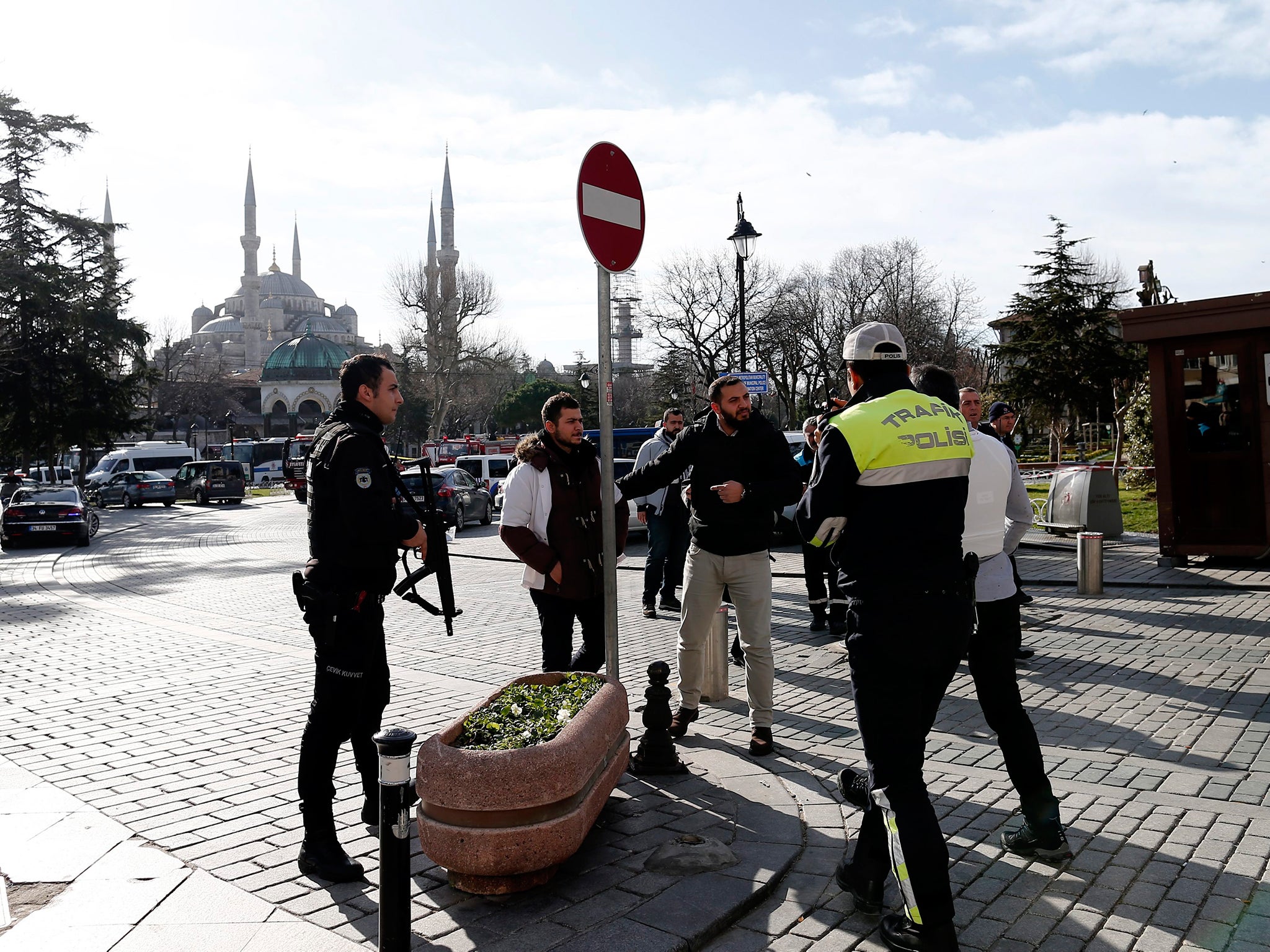Istanbul bombing travel Q&A: How significant is the attack? How will it affect tourism in the city?
Hundreds of thousands of British holidaymakers travel to or through Istanbul each year

Flights from the UK to Istanbul and other Turkish airports are continuing as normal, following the suicide bombing in the Sultanahmet district of Turkey’s largest city.
Hundreds of thousands of British holidaymakers travel to or through Istanbul each year, and around two million more visit resorts on the nation’s Mediterranean coast.
Here, The Independent's Travel Correspondent assesses the impact of the attack - and the options for people with future bookings to the country who are concerned about their safety:
Q| Besides the tragic loss of life in Sultanahmet, how significant is the bombing?
A| Bomb attacks by Kurdish, leftist and Islamist militants are common in Turkey. In Istanbul alone, there were four bombings last summer, and just before Christmas a mortar attack on the city’s second airport killed an aircraft cleaner and caused serious damage. But what is different about this attack is that it appears intended squarely to harm tourists.
To give you a sense of what this area is like: Sultanahmet Square is vast, and flanked by two ancient and monumental places of worship: the Blue Mosque and the Aya Sofia, the former Byzantine Church of the Divine Wisdom. It’s also at the heart of the tourist area, with many hotels and restaurants within a few minutes walk - including the Pudding Shop, the legendary cafe that was the starting point for the Hippie Trail across Asia in the Seventies. It’s an area that tourists keep returning to, and presumably the people behind the attack knew that they would be able to murder foreign visitors as well as local people.
The timing, though, is curious: although Sultanahmet is tourist-central, visitor numbers on a Tuesday in the second week of January are as low as they ever get. Some experts speculate that this suggests an element of desperation by the bombers.
Q| What is the Foreign Office saying?
A| Within hours of the blast, it told British travellers: “If you're in the affected area you should follow the instructions of the local security authorities.” More generally, the FCO warns - as it has done for years: “There is a high threat from terrorism.”
QI have organised a city break to Istanbul. Will I now be able to cancel or change destination?
A| Not without paying a penalty. You will have booked the trip while that “high threat from terrorism” prevails. Unless the Foreign Office warns against travel to Turkey’s biggest city - and experience suggests that it would take a very serious atrocity aimed at tourists to do that - then flights and holidays will go ahead as normal. If you want to change then you are likely to lose some or all of your money. “Disinclination to travel” is not an insurable risk.
In pictures: Istanbul explosion
Show all 9Q| I was tempted to book a family summer holiday on Turkey’s Mediterranean coast this summer, but now we want to cancel. What are my rights?
A| If you decide to cancel you will lose the deposit you have paid. It is possible that some holiday companies will allow anxious travellers to switch destinations for little or no penalty, but there is no obligation for them to do so.
Q| I have a trip to Africa booked with Turkish Airlines via Istanbul. Should I be worried?
A| Istanbul is becoming one of the world’s great aviation hubs, with flights to more destinations than any other airport. Turkish Airlines, the main carrier, is stepping up flights from a number of UK airports this summer, and offers connections from its Ataturk airport hub to a wide range of destinations - most recently adding Madagascar and Mauritius to the route network. Following the attack at Sabiha Gokcen airport on 23 December, security around airports has been intensified. The risks remain extremely low.
Q| What will the longer-term effect of the Sultanahmet atrocity be?
A| Istanbul’s tourist industry will suffer. The city is immensely popular, not just with British and other Western European visitors, but also with tourists from the Arab world - especially the Gulf area. Experience suggests that will trigger discounting in an effort to lure travellers back. The attack will undoubtedly have an impact on holidaymakers’ summer plans, and again prices may be cut to fill plane seats and hotel beds. Cruise lines may also adjust their schedules to cut down on time in the city.
Demand for Mediterranean holidays is strong, and some of this is likely to switch to destinations seen as safer, particularly Greece, Spain and Portugal. But one effect of this move is to trigger price rises for both flights and accommodation in those countries. You are unlikely to find the same value in, say, Tenerife or the Costa del Sol as in Bodrum and Antalya.
Sadly, one likely effect if the attack is viewed as a “success” by the perpetrators is that further assaults aimed at tourists could be carried out.
Subscribe to Independent Premium to bookmark this article
Want to bookmark your favourite articles and stories to read or reference later? Start your Independent Premium subscription today.

Join our commenting forum
Join thought-provoking conversations, follow other Independent readers and see their replies